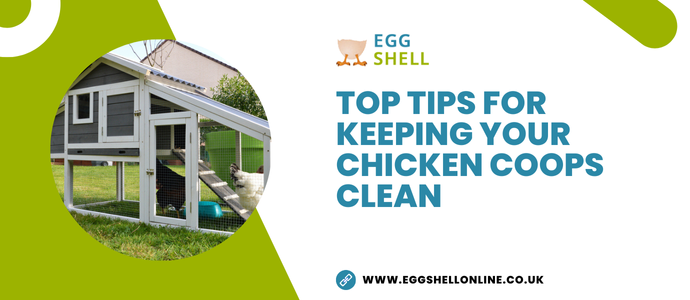One of the best ways to keep your chickens healthy and happy is by ensuring they have a clean space to sleep. Chicken coops protect them from the elements and ensure they are safe from predators. The chicken coop is also where your chickens will roost and lay their eggs.
Cleaning might not be the most pleasant task, but regular cleaning can actually help to make the task less taxing. By keeping on top of the cleaning with daily maintenance, you can minimise the work and ensure that it never gets too unpleasant.
Follow these tips to help keep your chicken coops hygienically clean and your flocks healthy.
The daily clean
You need to carry out a quick clean every day to help remove damp or soiled material and replace this with new sawdust. How long this task takes will all depend on how messy your chickens are.
Some well-trained chickens will always head to their roosting boxes to leave their waste. And if your chickens have free roam of a chicken run during the day, they’ll be less likely to make a mess in their coop.
The weekly clean
Once a week, you need to remove everything from the chicken coop and give it a good clean. This will help to reduce the risk of infestations from parasites like red mites, as they won’t have anywhere to hide.
Remove everything from the coop and wash down the floors with a chicken-friendly disinfectant. In the summer, you can hose down the coop completely and allow it to dry in the sun.
Pay close attention to the roosting box as this will be where the majority of the waste is found. Start by sweeping out the waste and then using a spray cleaning and water before scrubbing the area.
Vinegar is a highly effective cleaning product that will eliminate bad smells without leaving behind a smell that will bother your chickens.
The deep clean
Around once a month, you may want to consider a deep disinfection cleaning to help prevent the build up of smells and to eliminate the risk of parasites causing problems with your chickens.
You could use a pressure washer to get into the cracks and crevices and remove all traces of mites and their eggs. Boiling water is also a highly effective way to deal with parasites.
Make sure the space is dry before adding fresh bedding and sawdust on the ground. You should also pay close attention to the chicken feeders and drinkers and make sure you deep clean them at least once a week. Algae build up can be dangerous for your chickens so it’s vital to keep the drinkers and feeders hygienic.
Coop maintenance
As you are cleaning the chicken coop, make sure you check for signs of dampness or leaks. Address any issues with the roof or walls quickly to keep your chickens happy and healthy. It might be necessary to replace the roof felting after some time, so keep an eye on its condition.
If there are cracks or breaks in your feeders or drinkers, replace these as a matter or urgency. Cracks and breaks will not only make them less efficient, but they can also leak, or they can allow bacteria to build up.
If you have vents to increase air flow, check that they aren’t blocked as this can quickly lead to a build up of moisture which can make the space damp and unpleasant for your birds.
With a daily routine, you can make light work of the weekly clean, which will make the deep cleaning process much easier. And all of this will contribute to a healthier and happier flock.

